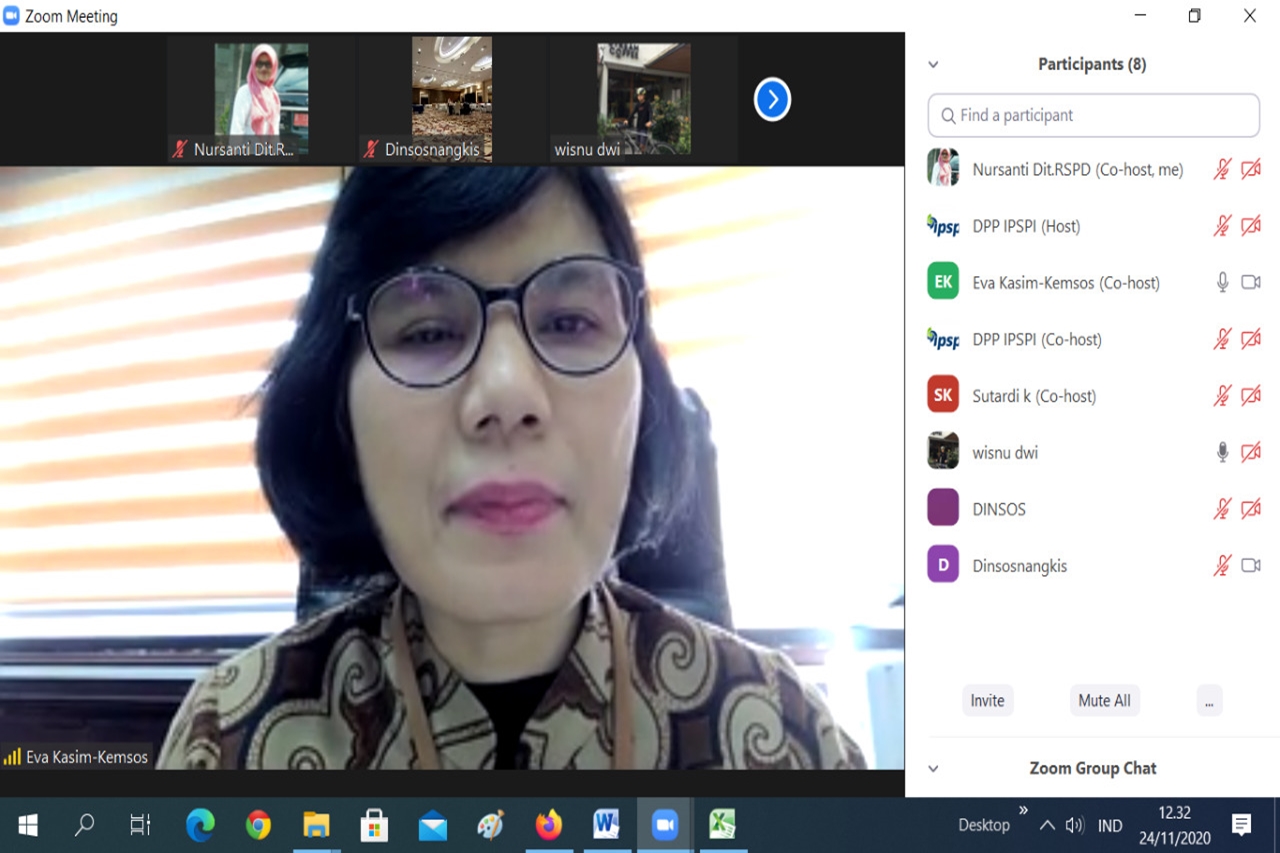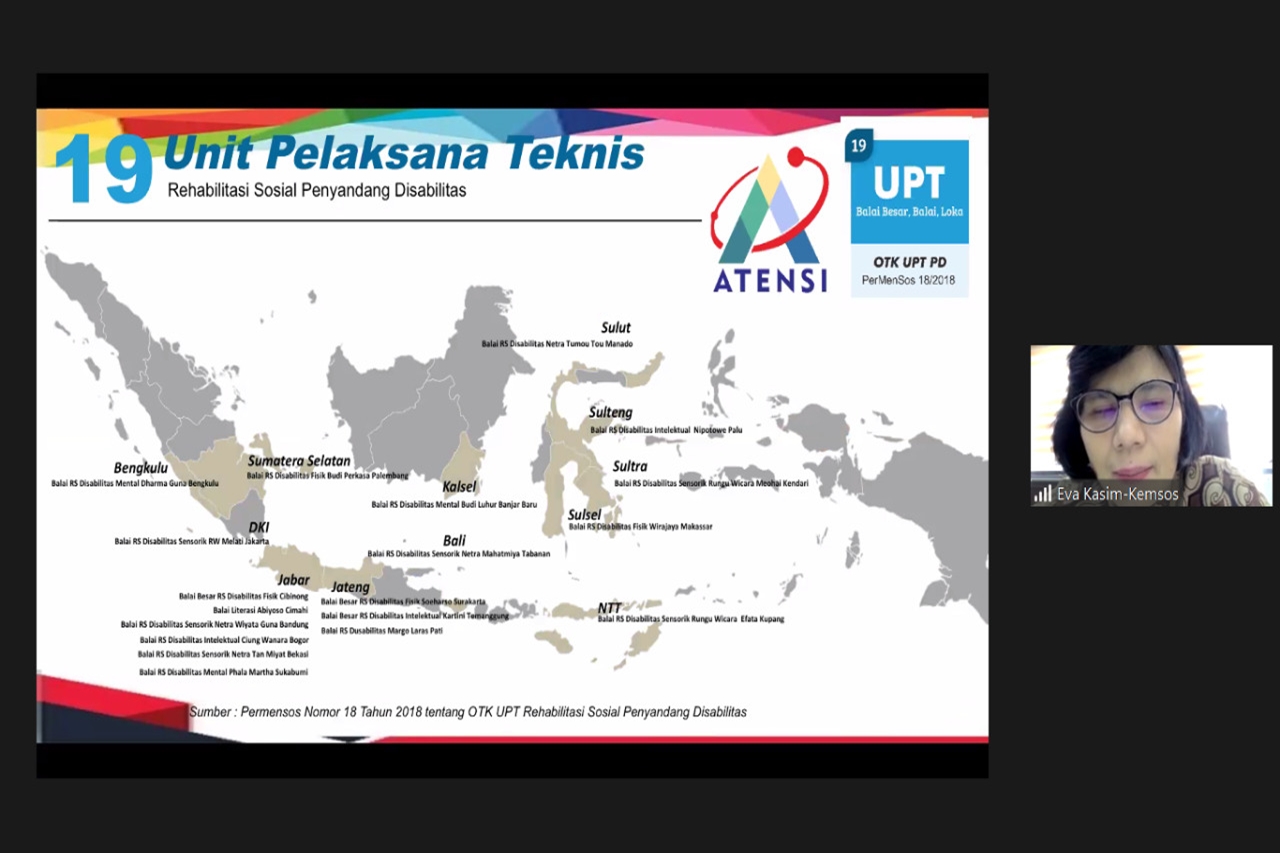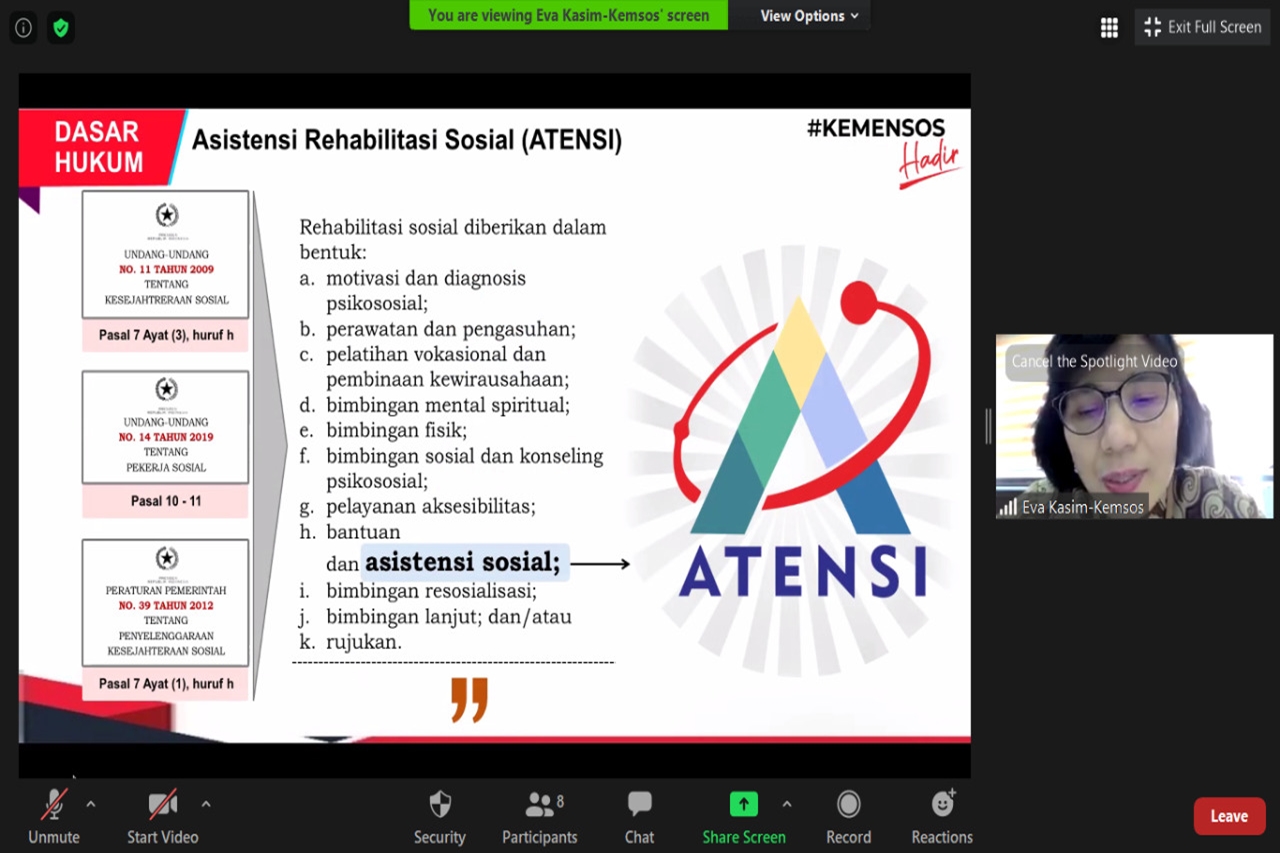JAKARTA (November 24, 2020) - Director of Social Rehabilitation of Persons with Disabilities in Ministry of Social Affairs, Eva Rahmi Kasim explained about the "Policy and Social Rehabilitation Program for Persons with Disabilities" virtually in activities carried out by the Bandung City Social and Poverty Reduction Service. In commemoration of the 2020 International Day of Persons with Disabilities, the theme of this event is Strengthening the Role of the Community in Supporting Government Policies in Empowering Disabilities in Bandung.
Mayor of Bandung, Oded M.Danial when opening the event conveyed that the essence of empowering persons with disabilities is to protect their rights in accessing all sectors of life which technically is not only carried out by the government.
"To serve 5.140 people with disabilities, there needs to be an increase in community participation. Let's take sides together in carrying out the disability rights protection program," said Oded.
Law Number 8 of 2016 concerning Persons with Disabilities states that persons with disabilities are any person who has physical, mental, intellectual, or sensory limitations for a long period of time who in interacting with the environment can experience obstacles and difficulties to participate fully and effectively with residents. other countries on the basis of equal rights.
“With this law, there has been a new paradigm shift in the perspective of persons with disabilities. Broader understanding of persons with disabilities, collaborative handling, recognition of services that facilitate access and proper accommodation,” said Eva.
The Ministry of Social Affairs already has a social rehabilitation program for persons with disabilities through direct and indirect services. “Social Rehabilitation Assistance (ATENSI) is a direct service carried out by the Technical Implementation Unit (UPT) of the Ministry of Social Affairs through the Social Rehabilitation Center for Persons with Disabilities. As an extension of the Ministry of Social Affairs in the regions, these centers have been adapted to all types of disabilities. There are social centers for physical disabilities, social centers for mental disabilities, social centers for sensory disabilities and social centers for intellectual disabilities," said Eva.
The function of the social welfare center for persons with disabilities is not only as a direct service provider, but also providing Communication, Information and Education (KIE); referrals and data collection. The service approach is prioritized to achieve social rehabilitation, so that the center seeks to fulfill the social functioning of persons with disabilities by meeting basic needs, being able to overcome their own problems and being able to carry out their social roles.
Eva added that indirect services by the central government, in this case the Directorate of Social Rehabilitation for Persons with Disabilities, refer to the division of authority as stated in Law Number 23 of 2014 concerning Regional Government. Central government will be more on policy making; capacity building; implementation of prevention campaigns; advocating for respect, protection, and fulfillment of the rights of persons with disabilities; cross-sectoral coordination; monitoring and evaluation as well as data collection.
ATENSI for Persons with Disabilities through three approaches, namely family, community and residential. Assessment is the keyword to find out the type of service, how it is served and where to get the source of the service. Referral facilities that can be used through individuals, the police, hospitals, social institutions and Social Welfare Institutions (LKS). Groups or communities including LKS and Disabled Persons Organizations (OPD) are also involved in disability service programs.
"Regarding the implementation of community-based ATENSI which has been carried out in the city of Bandung by Community Based Rehabilitation (RBM), the benefits have been recognized because of the collaboration between the central and regional governments, so we hope that RBM will be more synergistic," hoped Eva.
The UPT of the Ministry of Social Affairs in the Bandung City area includes the "Wyata Guna" Social Rehabilitation Center for Persons with Visual Disabilities (BRSPDSN) and the "Abiyoso" Indonesian Braile Literacy Center in Cimahi as well as LKS for Persons with Disabilities spread across the West Java region. Thus, it is hoped that more people with disabilities will be able to obtain services from both the central government and the local government of Bandung.
“Family as the main container in one's life must be involved in the implementation of ATENSI. In addition to persons with disabilities, families are given attention, empowerment, and improvement in handling family members with disabilities. Intensive family support, including through Home Care (Home Visit and Psychosocial Therapy); Family Preservation (Family Dialogue and Family Mediation); Parenting Skills (Psychoeducation) and Family Counseling,” explained Eva.
Assistants for Persons with Disabilities (PPD) have a strategic role to carry out data collection. “We must refer to the source of the Integrated Social Welfare Data (DTKS) for Persons with Disabilities by the Data and Information Center (Pusdatin) of the Ministry of Social Affairs as an effort to strengthen the social rehabilitation system that is integrated with social security, social empowerment and social protection. For that, I urge the social service to register the LKS with Disabilities in the DTKS so that the data can be entered," said Eva.
The Ministry of Social Affairs no longer only relies on services through centers, but based on needs that have been assessed by the Persons with Disabilities (PPD) who are trained professionals. Meanwhile, communities that are closer to the service beneficiaries are expected to be able to perform a referral function for the advanced service source system or other services needed by persons with disabilities as well as data collection functions.
"The Ministry of Social Affairs' Center also provides residential care services or places of care/care if the beneficiary is no longer in the family. Or they really need other services, for example, therapy is welcome to access the service center but not permanent because it is only temporary, “explained Eva.
On the same occasion, Head of the Bandung City Social Office Tono Rusdianto stated that the purpose of this activity is to increase public awareness that they can participate and support disability empowerment in Bandung.
"The synergy between the community and the government is very much needed to realize disability independence through their capabilities and optimizing the role and support of family, community and government," said Tono.
Community Based Rehabilitation (RBM) was also present to represent one of the community-based LKS in Bandung. "RBM is a community-based health effort with regional development programs in terms of prevention, disability, detection and rehabilitation as well as habilitation of all aspects of life. All of them aim to empower people with disabilities in all aspects of family and community life," said Head of RBM Bandung, Siti Muntamah Oded.
RBM Bandung City is committed to creating an institution for fostering and empowering people with disabilities to be independent and prosperous. Therefore, RBM targets its target areas from infants, children, adults and the elderly as well as all types of disabilities.
RBM's flagship program is "House of Inclusive Love". "Through this flagship program, we carry out assessments for people with disabilities, caregivers, cadres, medical personnel, family conditions, environment and handling needs. Furthermore, case conferences, home program training, provision of RBM cadres and training on the interests and talents of people with disabilities," said Siti.
On this occasion, Eva also conveyed about the Social Service Center (SERASI) which is being developed by the Ministry of Social Affairs as an integrative social service with the hope that the Center can carry out multiple services so that the support and collaboration of the Center with the community in Bandung is very much needed.
 English
English
 Bahasa
Bahasa



